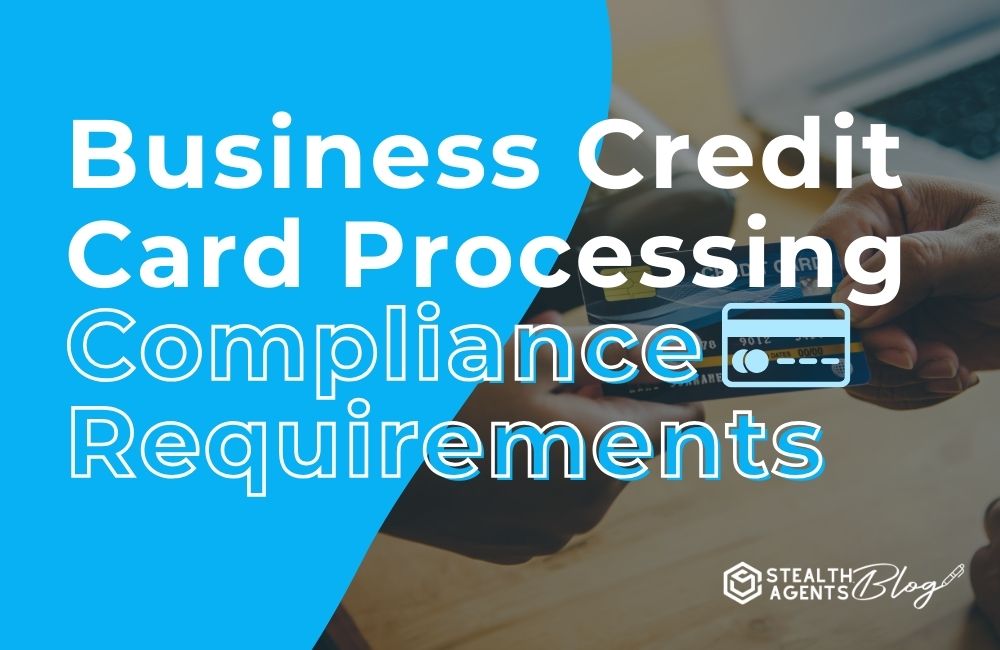The digital economy moves fast, with businesses constantly adopting new tools.
In this fast-paced environment, understanding credit card processing compliance can be tricky.
This blog will guide you through credit card processing compliance.
It might seem like complicated fine print, but understanding these standards will help you set up a secure and beneficial payment system.
Let Stealth Agents handle your business problems while you focus on growth.
Book now to learn more about our pricing!
What does a credit repair virtual assistant do with Business Credit Card Processing?
A credit repair virtual assistant plays a vital role in supporting businesses with credit card processing compliance requirements.
E-commerce virtual assistant tasks involve ensuring that credit card operations adhere to necessary standards and facilitating improvements in credit handling and documentation.
Why Compliance For Credit Card Processing is Crucial
When you swipe or type numbers into a credit card terminal, it’s not just a simple exchange.
It’s a complicated dance of private financial information that your business must protect at all costs.
If the thought of compliance makes your temples pound with regulatory dread, think of it as your defense against data breaches and losing customers’ trust.
It’s also your defense against fines and penalties that seem to be aimed at eroding your business’s finances for no reason.
Following compliance standards isn’t just a way to show you can handle governmental control.
It’s about ensuring customers feel safe when spending their hard-earned money on goods and services.
Being careful with their private information is the right thing to do and shows respect.
Stay with me, and I’ll quickly go over what these legal requirements mean and how, despite what most people think, following them is a chance for your business to grow safely.
Credit Card Processing Requirements
With the rise in online shopping and cashless transactions, it is crucial for merchants to have a smooth and secure payment process in place.
But what exactly are the credit card processing requirements?
1. Merchant Account
A bank account is the first and most important thing you need to be able to accept credit cards.
When a business has this kind of bank account, it can take credit or debit card payments.
To set up a merchant account, the business owner must provide relevant documents such as business registration, financial statements, and tax ID number.
The application process may also involve a credit check to assess the risk involved in providing credit card processing services to the business.
2. Payment Processor
After setting up a merchant account, you need to pick a payment provider.fc
This is a third-party company that handles the deals and makes sure the money moves safely from the customer’s account to the merchant’s account.
As a service, payment processors charge fees that change based on the type of transaction and the payment processor.
It is important to research and compare different payment processors to find one that suits your business needs.
3. Payment Gateway
A payment gateway takes card information from the customer’s device and sends it safely to the payment provider. It works like a virtual station.
It also checks for indications of fraud and ensures there are adequate money for the transaction.
Payment gateways can be used independently or included into the website of your store.
Verify that the payment gateway you select is compatible with the payment business you wish to use in order to guarantee the security of your transaction.
4. PCI Compliance
A payment gateway functions as a virtual terminal, ensuring the secure transmission of card information from the customer’s device to the payment processor.
It also conducts fraud checks and guarantees that the necessary funds are available for the transaction.
Merchants have the option of incorporating payment gateways into their websites or employing them as independent applications.
A payment gateway must provide the necessary security measures and be compatible with the payment processor you have chosen.
5. Payment Options
In addition to credit/debit cards, there are other payment options available for businesses, such as vouchers, ensuring a seamless and secure process for both the customer and the business., e-wallets, and direct bank transfers.
Merchants may benefit from these growing payment alternatives’ decreased transaction fees.
Some payment gateways also offer subscription management tools, making it easier for businesses to manage their subscriptions and track payment activity.
6. International Payments
Businesses no longer sell only locally, thanks to e-commerce.
Provide more payment methods to suit more customers and their choices.
7. Subscription Payments
Subscription-based businesses, such as streaming services or online magazines, often require recurring payments from customers.
Payment gateways can facilitate these recurring payments and offer automatic renewals and subscription management features.
These businesses need to ensure the security of their c
Takeaways
Meeting credit card processing requirements is essential for protecting cardholder data and maintaining the trust of your customers.
Adherence to PCI DSS and other relevant regulations helps prevent data breaches and ensures compliance with legal obligations.
Regularly updating your security measures, training your staff, and conducting audits are key practices for staying compliant and safeguarding your business.












